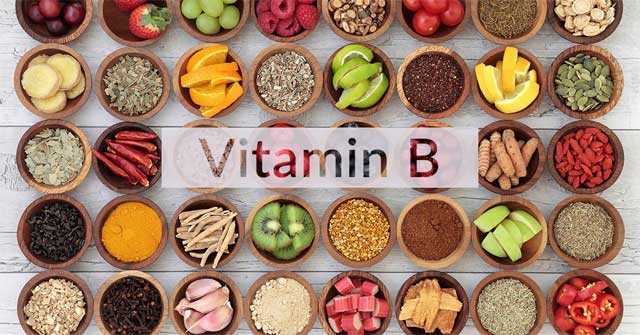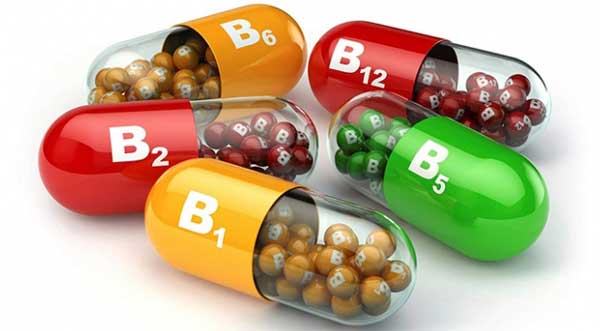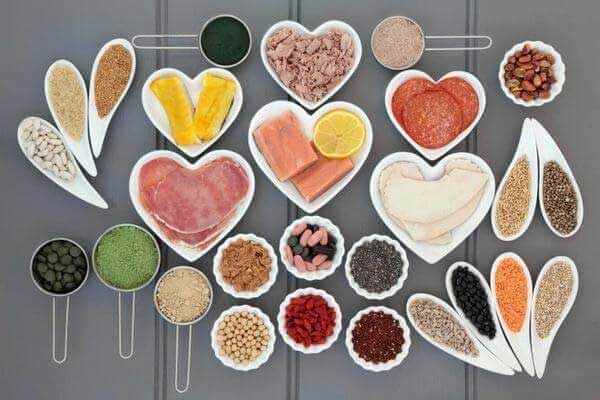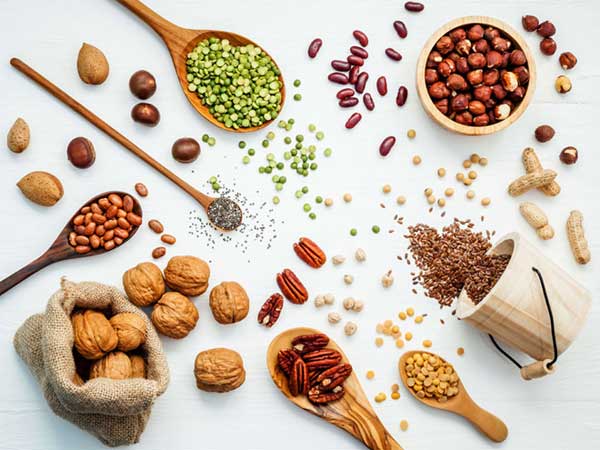What effect does synthetic B vitamin have?
There is a group of vitamins that are considered essential for the body. It consists of 8 different types that make up a small complex but have a tremendous effect.
This group of vitamins is important for everyone from old, young, girl, boy, pregnant women to those who are sick. It is Vitamin B , also known as Vitamin B.
So how does Vitamin B work for health? Together refer to the article below to get the answer.

>> See more:
- Supplementing Vitamin B12 may reduce the risk of diabetes
- Vitamin B12 deficiency during pregnancy increases the risk of premature birth
What is vitamin B synthesis?
In Latin, 'Vita' means life, and 'Amine' is the necessary chemical component for life. Synthetic vitamin B is a complex consisting of 8 different B vitamins, each of which has important benefits to the human body. If you take a supplement with 8 of these B vitamins, this is called a B-complex vitamin.
These 8 categories include:
- Vitamin B1 (Also known as Thiamin).
- Vitamin B2 (Also known as Riboflavin).
- Vitamin B3 (Also known as Niacin).
- Vitamin B5 (Also known as pantothenic acid).
- Vitamin B6.
- Vitamin B7 (Also known as Biotin).
- Vitamin B12.
- Folate (Also known as Vitamin B9 or Folic Acid if in synthetic form).

Eight Vitamin B have similar chemical roles and properties, although each has its own specific function.
The role of vitamin B synthesis for human health
1. Helps form blood and nerve cells
B-group vitamins like Vitamin B12 are essential in the production of blood cells from the bone marrow and the formation of nerve sheaths. Vitamin B also plays a role in nerve signaling, helping muscles contract and metabolizing energy so that the body can function daily.
Vitamin B deficiency can cause many neurological disorders because it will reduce blood cell formation, nerve sheath, neurotransmitter function.
This leads to symptoms such as anemia, numbness, weakness, confusion and memory loss.
2. Provide energy and support metabolism
Vitamin B, including folate, plays an important role in DNA synthesis - molecules that carry genetic information and help us grow from the moment of conception. Vitamin B is also needed for cell metabolism and energy production.
It also plays a role in metabolizing carbohydrates, proteins and fats, helping to fuel our body's energy supply. Vitamin B acts as an essential coenzyme in different metabolic processes, such as those involved in the synthesis of fatty acids and the creation of glucose.
Lack of Vitamin B can lead to complications in the thyroid and adrenal glands. Thus causing many negative symptoms such as fatigue, weight gain, difficulty sleeping, digestive disorders. In addition, lack of Vitamin B12, B2 and iron can cause anemia and fatigue.
3. Support development and help prevent birth defects
Consuming enough folate during pregnancy helps protect against fetal birth defects, such as spina bifida and memory loss. For more than three decades, researchers have known that mothers with children with spina bifida have lower levels of folate and other vitamins.
Therefore, today all pregnant women are encouraged to take folate supplements during pregnancy.
Folate is most important for fetal development during the first few weeks after conception, usually before a woman knows she is pregnant. That's why you should take support vitamins before deciding to become pregnant.
4. Support skin, hair, nails and muscles
Vitamin B supports cell rejuvenation, which benefits your skin, nails and hair. Vitamin B can enhance skin health by reducing irritation, redness, dryness, dermatitis and acne. It is for this reason that Vitamin B is considered 'golden' in the cosmetic beauty technology of women.
Vitamin B7 also helps heal wounds and supports the immune system against skin infections.
5. Can help fight heart disease
Folate, Vitamin B6 and Vitamin B12 have been shown to play a role in preventing cardiovascular disease, as well as other chronic diseases such as cancer.
However, there are still many things to study about the relationship between cancer and Vitamin B. So if you have cancer, talk to your doctor before starting B-vitamin supplements to be effective. the best.
What is the function of Vitamin B for cardiovascular health?
Folate, Vitamin B6 and Vitamin B12 help convert homocysteine into methionine, an amino acid that helps the body make new proteins. Homocysteine is an amino acid in the blood. High levels of this substance have been shown to be associated with dementia, heart disease, stroke and osteoporosis.
High levels of homocysteine indirectly cause arterial obstruction known as atherosclerosis. People with low levels of Folate, Vitamin B6 and Vitamin B12 are more likely to develop homcysteine and harden arteries, potentially increasing their risk of heart disease and stroke.
Vitamin B5 also protects cardiovascular health by helping to balance blood sugar, lower bad cholesterol, lower high blood pressure and help prevent heart failure.
Concurrent use of Vitamin B7 and chromium may help improve cholesterol levels, especially in people with diabetes and those at high risk of heart disease.
6. Help maintain a healthy brain
Vitamin B is needed to produce neurotransmitters in the brain, neurotransmitters throughout the body. It affects your mood, energy, appetite and more.
Vitamin B5 also plays an important role in the production of sex hormones and stress.
The absorption of Vitamin B from diet or supplements can improve your ability to cope with stress.
In fact, without Vitamin B, the body cannot survive, because Vitamin B plays an important role in the adrenal glands. This is why people who suffer from prolonged stress or fatigue are encouraged to take supplements to take B-complex vitamins.
B-group vitamins like Vitamin B7 can help boost thinking, energy and concentration.
Benefits of Vitamin B6 also include proper brain development and brain function.
The proper use of Vitamin B also works well for memory function and protects against cognitive decline, Alhzeimer as well as dementia in the elderly.
Taking Vitamin B6 may also work for children with behavioral disorders, including attention deficit hyperactivity disorder.
Which group of B vitamins are there in?
Supplement foods rich in Vitamin B every day to prevent disease and maintain health. Here are the food groups that contain many types of Vitamin B.

Meat, fish and dairy products:
Chicken, liver, eggs and salmon are foods rich in Vitamin B5, B8 and B12. In addition, this group of substances also comes from yogurt and milk. Add these foods to your diet to enjoy many health benefits.
Cauliflower, mushroom:
Vegetables that are high in Vitamin B5 include cauliflower and broccoli. Besides, mushrooms are also a significant source of Vitamin B5.
Bean:
This is a good source of Vitamin B8. Eating 100 grams of white beans or lima beans can give you 65 and 44 mg of inositol (Vitamin B8), respectively. In addition, beans help to strengthen fiber to prevent constipation.
Yellow melon and citrus fruit:
Yellow melon and citrus fruits (except lemon) can help you supplement Vitamin B8. Not only that, these fruits are also a repository for good Vitamin C for skin and blood vessels.
Nuts:
A handful of nuts (like cashew nuts, almonds, sunflower .) is one of the most effective ways to absorb Vitamin B5. Adding sunflower seeds to the food preparation process not only increases the flavor of the dish but also provides you with significant amounts of pantothenic acid (Vitamin B5) needed to perform many different chemical functions.

Whole-grain bread:
This is also a significant source of Vitamin B8 for you. Each slice of 37 grams of whole-grain bread contains about 13 mg of inositol.
As with beans, whole grain bread helps you increase the amount of fiber for your body.
Seafood:
Seafood is the most abundant source of natural Vitamin B12.
In addition to a diet with the above food groups, you can also supplement Group B vitamins using the B-complex functional pill as below:
- B-complex 50 Solgar (50 tablets) - Reference price: 370,000 VND.
- B-Complex health protection with Vitamin C Solgar (100 tablets) - Reference price: VND 550,000.